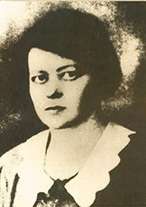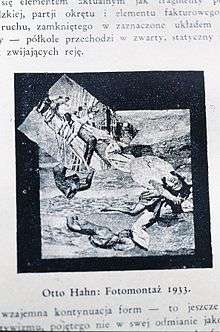Debora Vogel
Debora Vogel (1902 – 1942) was a Polish philosopher and poet.
Debora Vogel | |
|---|---|
 | |
| Born | 1902 Burshtyn, Galicia |
| Died | 1942 (aged 39–40) Lwów, occupied Poland |
| Occupation | Philosopher, poet |
| Spouse(s) | Barenblit |
| Children | 1 |
She was born to a Polish-speaking family in Burshtyn (Galicia, now Ukraine). During World War I her family fled to Vienna and moved later to Lviv (formerly known as Lemberg), where Vogel spent most of her life. She studied Philosophy and Psychology at the Jan Kazimierz University (now Ivan Franko National University of Lviv).
Early career
Vogel graduated from the Lwów Jewish gymnasium. During her time there, she was active in the Zionist youth movement. She later studied philosophy in Vienna and Polish literature in Cracow. In 1926 she obtained her Ph.D. For her doctoral dissertation she chose to examine the influence of Hegel’s aesthetics upon Józef Kremer. After completing her education, Vogel taught psychology at a college in Lwów.
Vogel began writing poetry while at the university. She initially wrote German poetry, but switched to Yiddish literature. She excelled at writing in Yiddish although it was not spoken at her home. She moved about in Yiddish literary circles and contributed articles for several Yiddish journals. Two of these were the Polish journals Sygnały and Wiadmosci Literackie. She was also a contributor to Tsushtayer, the short-lived Lwów Yiddish journal of literature and art. She published essays, art reviews, and her own poems and essays on poetry in the journal.[1]
She became a correspondent and close friend of writer and painter Bruno Schulz, from Drohobych.[2]
Poetry
Vogel's poetic legacy is marked for its experimental spirit. Her poems, mostly written in the 1930s, reflect the radical and minimalistic outlook that all art aspired toward during this period in history. Her experiment in poetry was mostly about fusing poetry and art. She called this technique 'white words,' and described it as an attempt to "create a new lyric poetry of the urban condition." This style was, however, not liked by critics both during her lifetime and later, who considered it too intellectual, obscure and devoid of feminist themes. Vogel responded to such claims by stating that her style was not deliberate, but an outcome necessitated by life's experiences.[1]
World War I
World War I forced Vogel's family to flee to Vienna. From there they moved to Lwów, where Vogel would spend the majority of her life.[1]
Marriage
In 1932 Vogel married Barenblit, a Lwów architect and engineer. In 1937, their only son, Anshel, was born.[1]
Death
Together with her husband and son, she was killed in the Lwów ghetto in 1942.
Works
Vogel was a prolific poet and essayist. Her most famous poems are ″You are Light and Bowing,″ (1929), ″Day-Figures″ (1930), ″Mannequins″ (1934), ″Legend of Silver″ (1935). She also wrote some prose. These include Acacias Bloom (1935), Fragments of a Montage-Novel (1936), and Military Parade (1938). Vogel's essays include; Theme and Form in the Art of Chagall (1929), ′White Words′ in Poetry (1931), Stasis, Dynamics and Contemporaneity in Art (1936) and The Literary Genre of Montage (1937).[1]

References
- Chaver, Yael. "Jewish Women: A Comprehensive Historical Encyclopedia". Jewish Women's Archive. Retrieved 6 August 2013.
- Anna Maja Misiak (30 August 2008). "Im Schatten von Bruno Schulz" (in German). Zurich. Neue Zürcher Zeitung. Retrieved 5 August 2013.
Further reading
- Banks, Brian R. (2006) Muse & Messiah: The Life, Imagination & Legacy of Bruno Schulz. Inkermen Press, UK
- Schnee, Jordan L. (2019) A selection of Vogel's poetry from Tog-Figurn in English translation: https://www.asymptotejournal.com/special-feature/dvoyre-vogel-figures-of-the-day/